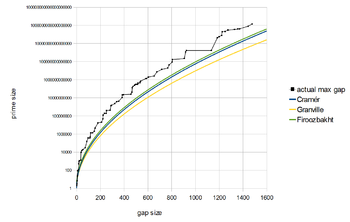When you go up the natural numbers ladder, there are (on average) bigger and bigger gaps between consecutive prime numbers.
If you look at primes as islands, there are lakes of composites between them.
The lake between 19 and 23 is 3 composite numbers long, for example. Or between 89 and 97 there are 7 composites.
Those lakes are greater and greater on average, as it is well known. Albeit there are always small ponds of just 5 composite numbers long, no matter how far you go. (There are likely infinity many lakes with just 1 composite, too. Which is another form of the so called Twin Primes Conjecture. A few years ago it has been proved that there are always less than 70000000 large lakes as you go up the naturals. Some time later, that 70 million has been improved to just 5, but not yet to 1.)
Say, that you have just sailed across some recordly wide composite lake and you are on a prime island again. What can you expect, how much wider will the next record lake be? Usually 2 more composites wider than the previous largest, right?
No. Every new record is usually quite greater from the previous one.
1,2,2,2,6,4,2,2,12,2,8,8,20,14,10,16,2,4,14,16,6,26,30,10,2,12,14,2,32 ...
These are the increments of every new record composite lake.
P.S. Haven’t been able to Google this story.
EDIT:
Then, have been able to Google some about this. The so called maximal prime gap goes like this, says Wikipedia:

Not as smoothly and gradually as those three coloured functions predict, but quite abruptly in reality.
